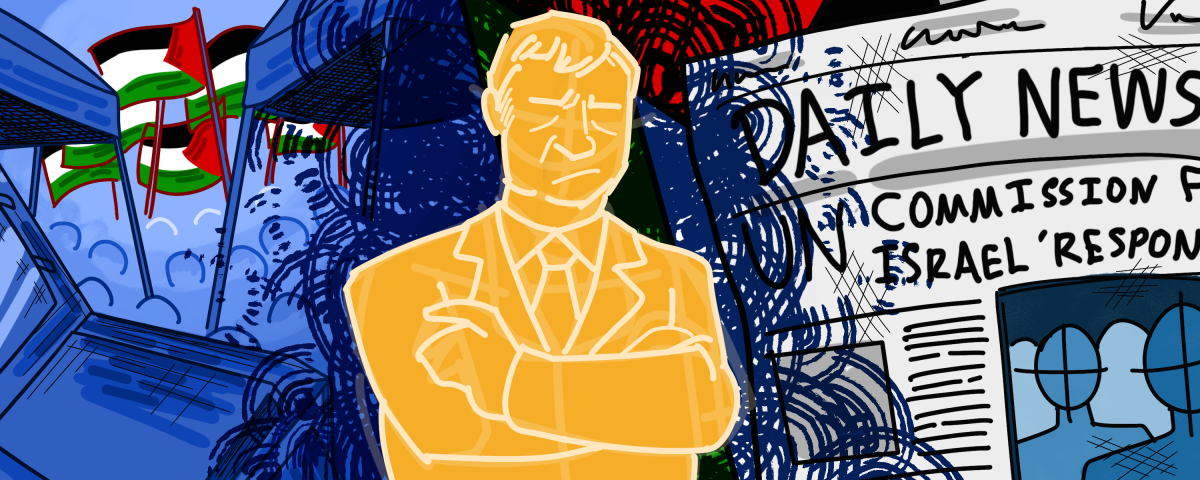In its 44 years of publication, The Mercury has typically focused on hyper-local journalism: things which affect the UTD community and local DFW area instead of state or national-level coverage. In the wake of student protests and the events of May 1, however, the scope of our coverage has had to expand to include global geopolitical conflicts and the words we use to discuss them.
In the past two years, hundreds of students have worked to pass Student Government resolutions and organize walkouts, sit-ins and protests on a scale never before seen at UTD. The large wave of campus activism ties back directly to Israel’s actions in the occupied territory of Palestine. Student activists at UTD have specifically called for the university to divest from five specific companies: Raytheon Technologies, Lockheed Martin, Boeing, Northrop Grumman and General Dynamics — which amounts to $3.5 million in total investments which amounts to a mere 0.005% of the total UTMCO investments — during a time in which the U.S. provided 69% of total arms imports to Israel. as well as demanding the university officially support a permanent cease-fire in Gaza. It is imperative that The Mercury use the most accurate and representative terminology possible when discussing the political background of campus events.
Words are the main medium through which The Mercury communicates news, and thus it is imperative that our choice of words reflect the up-to-date information available. A change in terminology, even if minor, can have wide-reaching ramifications for an article and the paper as a whole. Terminology determines how agency is diffused, the immediate biases a reader will face and what is being treated as the baseline of discourse. Each media publication, no matter how neutrally it presents itself, has its own baseline, influenced by a variety of factors such as geopolitical, ideological and monetary interests. Like countless other news outlets, The Mercury typically follows the Associated Press’ guidelines for everything from Oxford comma usage to identity labels to whether something should be phrased as a “war” or a “conflict,” and while the language approved by AP has evolved in recent years to be more inclusive, the lingering specter of Eurocentrism remains, particularly around the foreign interests of the U.S. It is up to The Mercury to decide whether to accept AP’s guidance for political situations that have been historically improperly handled by U.S. journalism – such as American journalists helping normalize U.S. imperialism since the 19th century — or pioneer our own in-house rules.
In our May 20 editorial, The Mercury decided that to provide the most accurate information when describing Israel’s actions in Palestine, AP’s guidance was inadequate. The decision to use language such as “apartheid,” “genocide” and “occupation” was not made lightly and was influenced by a broad range of sources and experts at the time of creation and in the weeks since publication.
Holocaust survivor and Human Rights Watch co-founder Aryeh Neier wrote in the June 6, issue of the New York Review that in his six decades participating in the human rights movement internationally, he has rarely used the term “genocide” because of its severity. Neier also did not initially support the argument put forth by South Africa that Israel’s actions constituted genocide; however, Neier writes that his opinion changed because of Israel’s “sustained policy of obstructing the movement of humanitarian assistance into the territory,” a policy, Neier says, that has cumulatively led to the starvation of Palestinians amid the continued bombing campaign in Gaza.
As part of the International Court of Justice ruling that posited Israel was plausibly committing genocide, the ICJ instituted provisional measures which required Israel to prevent operations which would harm civilians while allowing for humanitarian aid to enter Gaza. On May 11, twelve Israeli human rights groups signed a letter which urged Israel to comply with the ruling, since humanitarian aid had dropped by 50% since its issuance from the ICJ, according to the signatories.
On June 19, the UN Commission of Inquiry on the Occupied Palestinian Territory found that Israel was responsible for various war crimes including but not limited to “extermination, intentionally directing attacks against civilians, murder or willful killing, using starvation as a method of war, forcible transfer … and cruel or inhuman treatment.” These crimes and continued “extermination” campaign carried out against the Palestinian people alongside the dehumanizing rhetoric used by members of Israel’s government and war cabinet meet the criteria outlined by the U.N. Office on Genocide Prevention and the Responsibility to Protect.
The Mercury is committed to representing the entire student body, and to this extent it is our duty to provide information that is in accordance with the truth. Our journalism must be critical and it must be factual. Students are always welcome to send letters to the editor to The Mercury if they wish to share their thoughts about our articles and policy. If you have any questions, please reach out to [email protected].






